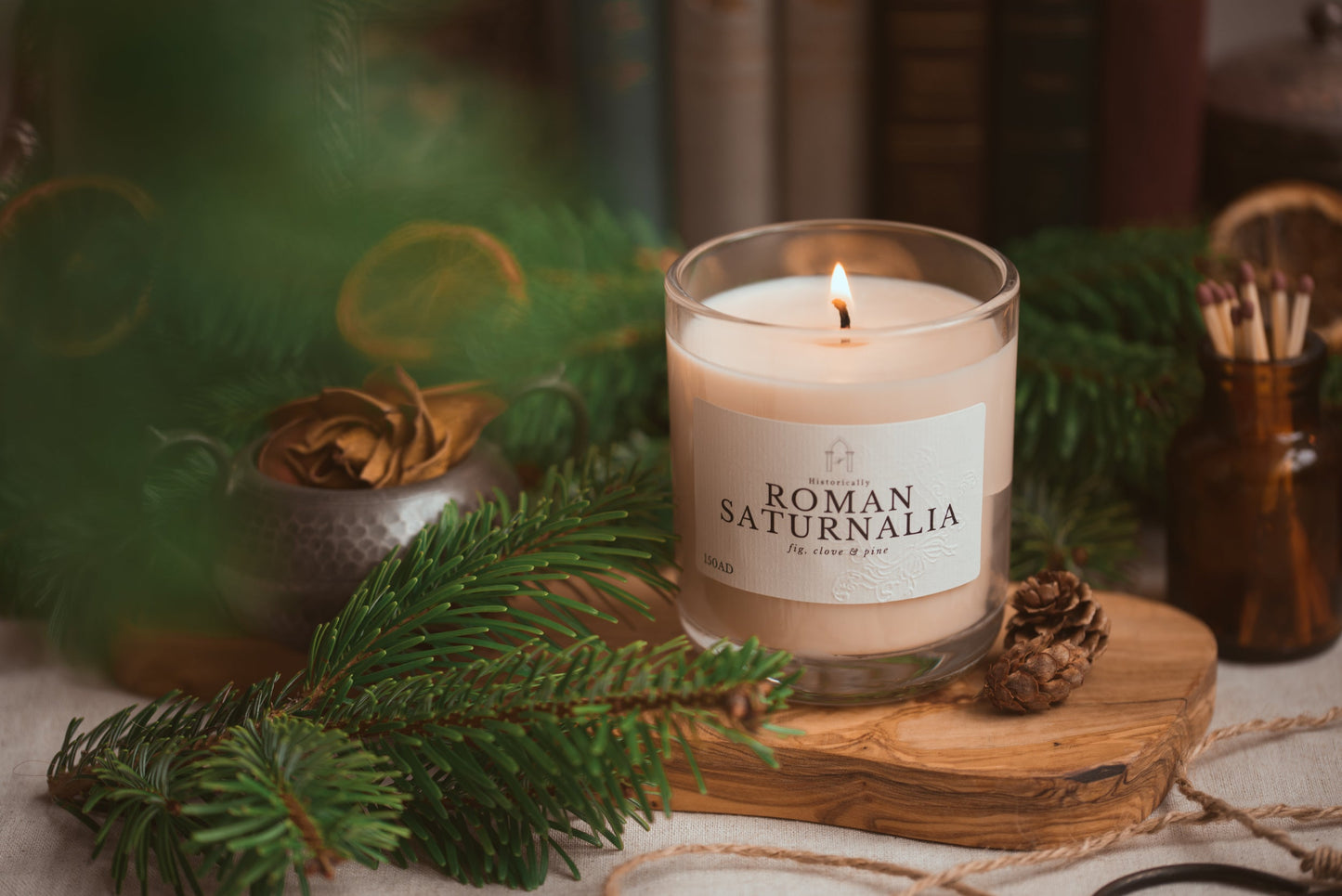Historically
Roman Saturnalia
Roman Saturnalia
Couldn't load pickup availability
Ancient Britannia: Roman Saturnalia
Step into the indulgent celebrations of Roman Saturnalia, where unrestrained revelry dances amidst the distant, pine-clad highlands of Britannia. Lush, ripe figs intertwine with the potent spark of cloves and the grounded nobility of pine, crafting a scent that transports you to decadent feasts, ceaseless merriment, and the paradoxical unity of the conquerors and the conquered under the ephemeral rule of festivity.
Share
Scent Notes
Scent Notes
fig, green leaf, orange, clove, caramel & pine
Delivery & Returns
Delivery & Returns
Dispatch times
Our candles are made to order and most will take between 1-7 business days to dispatch.
However, if you are wanting your order sooner or for a specific date please get in touch (via email or in the message box at checkout) and we can sort something out for you!
Delivery Times
We currently offer standard delivery with Royal Mail 2nd class which should arrive between 2-3 days after dispatch and Royal Mail 1st class which should arrive between 1-2 days after dispatch.
NOTE: Please note that during the months of November and December we use Royal Mail Tracked. This is more expensive than normal but we have found means that your parcels are safe and get to you in time.
Shipping outside the UK
We are more than happy to ship to America and Australia, unfortunately we cannot ship to the EU at this time.
If you would like an order to be delivered to Australia please do not hesitate to contact us via our contact page, email or Instagram message and we will calculate the shipping costs for you and complete your order via invoice.
Please note that customers are responsible for paying any import VAT, taxes and fees.
What is your return policy?
Please note earrings cannot be returned and refunded for hygiene reasons.
We are happy to accept returns if you are unhappy with your purchase.
Contact us within: 14 days of delivery
Dispatch items back within: 30 days of delivery
Request a cancellation within: 24 hours of purchase
Buyers are responsible for return postage costs. If the item is not returned in its original condition, the buyer is responsible for any loss in value.
Item damaged in transit
Sometimes accidents happen.
If you receive a parcel that has been damaged in the post please send a picture to us showing the damage within 48 hours of your parcel being delivered and we can discuss options with you. No worries.
Safety Information
Safety Information
I. Keep candles away from curtains, fabrics, furniture, and draughts.
II. Avoid placing candles under shelves; maintain a 3-foot (1-meter) clearance above.
III. Prevent contact with clothes and hair; place candles out of reach.
IV. Keep children and pets at a distance from candles.
V. Maintain at least 4 inches (10cm) between burning candles.
VI. Extinguish before moving; avoid objects falling into hot wax.
VII. Never leave burning candles unattended.
VIII. Safely extinguish with a snuffer or spoon, not by blowing.
IX. Double-check to ensure candles are completely out.
Scent History
Scent History
Fig
The history of figs is deeply rooted in antiquity, tracing its origins to the Middle East and Western Asia over 4,000 years ago. Across various ancient cultures, figs held a revered status, with Egyptians using them as symbols of abundance and offerings to gods, and the Greeks and Romans incorporating them into their cuisine and sweetening with them. Trade routes and conquests spread figs to distant lands, with ancient Romans preserving them through drying, solidifying their place in cuisines worldwide. Today, figs remain beloved for their versatility, gracing culinary creations from pastries to salads, and their enduring presence in traditions and cultures testifies to their rich history, connecting us to the culinary heritage of ancient eras.
Clove
Clove, renowned for its aromatic and pungent flavor, boasts a storied history dating back thousands of years. Native to the Maluku Islands in Indonesia, cloves were among the earliest traded spices globally, prized both as a culinary delight and for their medicinal properties. In ancient China and India, cloves were valued for their potential to address dental, digestive, and respiratory ailments, with clove oil being a key component in traditional remedies. Their journey along ancient spice routes popularized cloves across Europe during the Middle Ages when they were considered a luxury spice due to high demand and cost. In recent history, global clove production expanded, making this spice accessible worldwide. Today, cloves are integral to various cuisines, offering depth to dishes, and are used in dental care products, perfumes, and traditional smoking blends. This enduring appeal showcases cloves' rich history and their role in the global spice trade and cultural exchange.
Pine
Pine trees, members of the Pinus genus, have a history deeply entwined with the natural world and human civilization. With origins stretching back millions of years, they stand among Earth's oldest tree species, pre-dating many others. Throughout history, pines have held immense cultural and economic importance. In ancient Greek and Roman civilizations, pine trees were steeped in symbolism and mythological significance, often revered as sacred to specific deities and fashioned into wreaths and garlands for celebrations. Valued for its versatile wood, pine played pivotal roles in construction, shipbuilding, and fuel. The resin, extracted as pitch or tar, proved essential in sealing and waterproofing boats, facilitating ancient maritime explorations. Native American tribes utilized various parts of pine trees for sustenance, medicine, and shelter. These ancient forests also served as critical contributors to ecological balance, offering habitats for diverse wildlife and bolstering ecosystem health. Today, pine continues to be treasured for its beauty and utility across various industries, including forestry and paper production, underscoring the enduring connection between humanity and the natural world.




